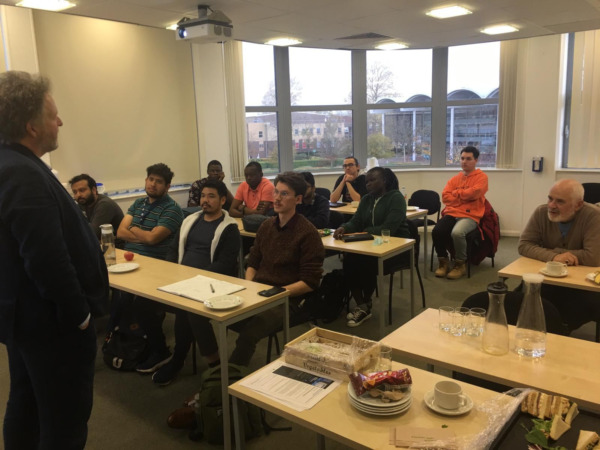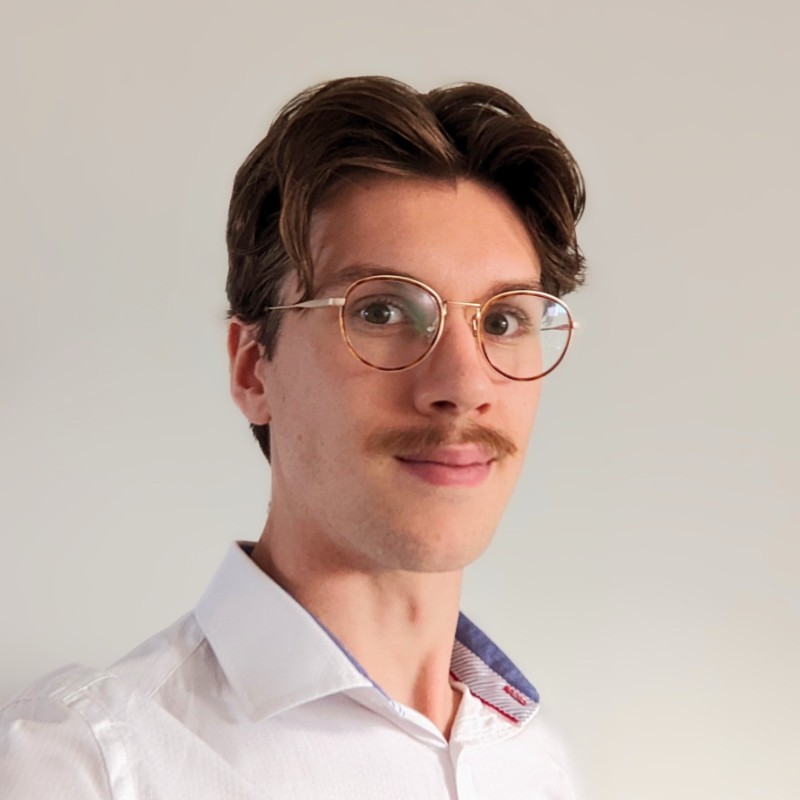Fin Underhill: Highlights of my course so far
23/02/2023

Since arriving at Cranfield, I have jumped into the full student experience the university has to offer. In my first month I:
- Attended the ‘Intro to Careers Team’ seminar.
The Careers Team covered everything that Cranfield’s Careers Support has to offer, and where to go for a whole load of careers advice; from CV and cover letter development, to interview preparation and presentation skills!
- Sat in on a professorial talk on Agri-Tech.
Professor David Rose gave an inspiring talk on the drawbacks of pushing technologies in the agriculture sector before they’re field-tested and technically feasible.
- Networked across the SWEE community.
Knowing people from across the faculty means your pool of ideas isn’t limited to just your own course, and you can build holistic solutions through people with different perspectives.
- Developed my Python and MATLAB abilities.
Explored the library to create my reading list.
I have met so many fantastic people, both students and staff on the Advanced Heat Engineering MSc. My course alongside fellow PhD students had the honour of receiving talks from William Nuttall, Professor of Energy at The Open University, Ben Anthony and Peter Turner.
My learning highlights were;
- Fusion Island and the drive for a self-sustained hydrogen facility, if Fusion can reach commercial maturity.
- Environmental Impact of power generation throughout history, and the lacking response to fix the issue.
- Solar Thermal Storage and efficient heliostat positioning, based on the global position of the solar field.
The networking was great for us all, and every speaker warmly responded to our barrage of excited questions.
A massive thank you to Patchigolla Kumar, Reader in Low Carbon Energy Systems at Cranfield University Advanced Heat Engineering MSc Course Director for organising these talks. I cannot wait to attend more in the future.

The content of the course has expanded my understanding of real-world applications for thermal systems. The professors of Advanced Heat Engineering are engaging and passionate in their subjects and have made my experience unforgettable. A great thing about this course is how often industrial partners come in for networking events to emphasise how our knowledge can be applied in business.
What is life on campus like?
Spending my days on campus has been great so far. Cranberries in Stafford Cripps do great tasting, and varied hot meals for lunch which is super convenient when trying to maximize my time in the library! The two food trucks on campus also serve fantastic burgers, kebabs, dirty fries and loads more.
What do you have coming up?
In preparation for our group project in March 2023, our team led by Patchigolla Kumar came together to brainstorm applications for a thermal desalination unit powered by a Small Modular Reactor (SMR).
Our initial ideas aim to provide water security in areas with poor access to fresh water. A constant and independent power supply from the Small modular reactors would power a thermal desalination unit day and night.
We will investigate processing the brine produced from the desalination unit to acquire minerals for EV batteries and Lithium Bromide solutions.
Lastly, we are interested in harnessing the waste heat from the desalination unit to power an absorption chiller which will produce chilled water, to be used for heat rejection in the SMR power cycle.
Just as there are different ‘colours’ to hydrogen depending on the power source used to produce it (nuclear power produces Pink Hydrogen), then why not ‘colour’ our desalinated water the same.
As a team, we are investigating nuclear desalination to produce fresh water for communities with low access to fresh water. My contribution will be to analyse the power cycle of the Small Modular Reactor (SMR) and investigate feasible heat exchanger designs.
The group project has been a collective effort to see what we can do with the information we learn in our course, and it’s exciting to piece together everyone’s passions into one innovative project.
Do you have any tips for other students?
My tips for your group project are:
- The better your connection with your team, the easier your time will be!
- It’s never too early to start thinking of project ideas.
Categories & Tags:
Leave a comment on this post:
You might also like…
Keren Tuv: My Cranfield experience studying Renewable Energy
Hello, my name is Keren, I am from London, UK, and I am studying Renewable Energy MSc. My journey to discovering Cranfield University began when I first decided to return to academia to pursue ...
3D Metal Manufacturing in space: A look into the future
David Rico Sierra, Research Fellow in Additive Manufacturing, was recently involved in an exciting project to manufacture parts using 3D printers in space. Here he reflects on his time working with Airbus in Toulouse… ...
A Legacy of Courage: From India to Britain, Three Generations Find Their Home
My story begins with my grandfather, who plucked up the courage to travel aboard at the age of 22 and start a new life in the UK. I don’t think he would have thought that ...
Cranfield to JLR: mastering mechatronics for a dream career
My name is Jerin Tom, and in 2023 I graduated from Cranfield with an MSc in Automotive Mechatronics. Originally from India, I've always been fascinated by the world of automobiles. Why Cranfield and the ...
Bringing the vision of advanced air mobility closer to reality
Experts at Cranfield University led by Professor Antonios Tsourdos, Head of the Autonomous and Cyber-Physical Systems Centre, are part of the Air Mobility Ecosystem Consortium (AMEC), which aims to demonstrate the commercial and operational ...
Using grey literature in your research: A short guide
As you research and write your thesis, you might come across, or be looking for, ‘grey literature’. This is quite simply material that is either unpublished, or published but not in a commercial form. Types ...







